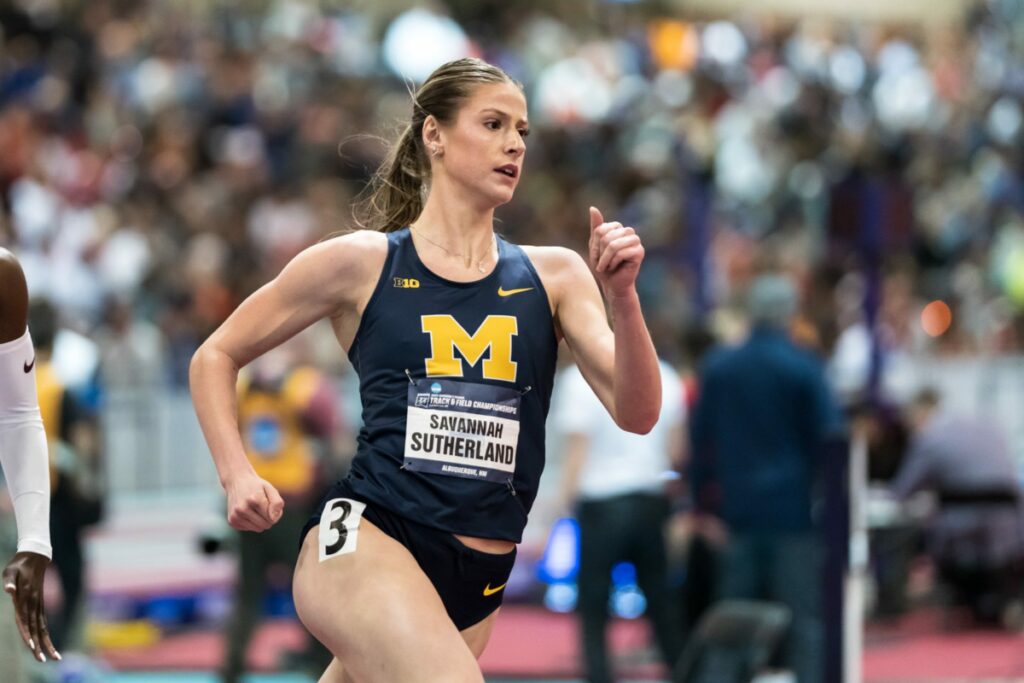At 21, Savannah Sutherland of Borden, Sask., is making a name for herself in the NCAA for the University of Michigan. She has won an NCAA 400m hurdles title, reached the semi-finals at the World Championships, and ranks fourth among the fastest women globally in her event this year (behind only superstars Femke Bol and Sydney McLaughlin-Levrone)—yet she can’t earn a cent from the NCAA’s Name, Image, and Likeness deals (NIL), because she’s Canadian.
While some of Sutherland’s University of Michigan teammates benefit financially from NIL, she cannot. Her F1 student visa allows her to study full-time in the U.S., but under visa rules, she cannot legally earn money or work–a restriction that places her and thousands of other international athletes in the NCAA at a financial disadvantage compared to their American teammates.
All gas, no brakes 😤
With her 400m hurdles time of 53.26 at the NCAA Championships, Savannah Sutherland now holds the fastest time in B1G history and the No. 5 time in NCAA history! pic.twitter.com/HEaSNM1PGm
— Michigan Track & Field / Cross Country (@UMichTrack) June 14, 2024
“It came out following my first year,” says Sutherland. “I first thought it would be a resource for all athletes. It wasn’t until after the fact that they began to give information to the international students not being able to earn money.”
Three years ago, NCAA athletes were prohibited from profiting from fame and clout. It was not until 2021 that the NCAA passed a rule allowing all student-athletes to monetize their name, image, and likeness. While an NIL deal may not hold the same monetary value as a professional deal, it grants athletes the ability to compete at the collegiate level while earning a steady income. “Athletes can use their platform to promote brands and are compensated with (brand) products or money,” says Sutherland. “For international athletes, they don’t get anything.”
The only workaround for Sutherland would be to post from Canada, but this could complicate future U.S. visa or residency applications, or even lead to deportation. Sutherland, who has more than 12,000 followers on Instagram, regularly receives messages about small deals, but is forced to decline them. “I have to tell them that I am not able to,” she says. “I have quite a few teammates making a comfortable amount of money off NIL.”
Despite not being able to cash in, Sutherland thinks it is a great opportunity for NCAA athletes to get the recognition they deserve. “We all put so much time and effort into training and our social media and deserve to be compensated for it.”

The NCAA is the premier academic-focused sports development league globally, attracting athletes from around the world to the U.S. to train, compete, and eventually turn professional. However, international track and field athletes like Germany’s Leo Neugebauer (NCAA decathlon champion), Great Britain’s Louie Hinchliffe (NCAA 100m champion) and Canada’s Christopher Morales Williams (NCAA 400m champion) miss out on NIL deals. “It is difficult, because it doesn’t put international athletes on an even playing field with American athletes,” Sutherland adds. “They are gaining experience and a foot in the door with brands, which we can’t access.”
2024 NCAA 5,000m champion (and record holder) Parker Valby of the University of Florida is one of the highest NIL earners in track and field. According to Essentially Sports, Valby reportedly earns more than $100,000 per year through NIL with global sporting brand Nike–a significant amount for a university athlete. Valby’s lucrative deal exemplifies the types of opportunities that are not available to Sutherland and other international athletes.
Sutherland just finished her third year at the University of Michigan, and even though she has the accolades to turn pro and earn a sponsorship deal, she remains focused on finishing what she has started. “My number one goal is to finish my pre-med degree,” she says.

